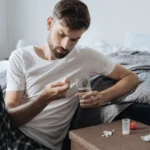High-Functioning PTSD
Identifying the Symptoms of High-Functioning Post Traumatic Stress Disorder and Getting Support
Table of Contents
ToggleIt can be hard to spot high-functioning PTSD from a distance. On the surface, the affected person may seem like they are doing just fine. The obvious, overwhelming PTSD symptoms that are often noticed by others will be missing, even though they are struggling on the inside to deal with the repeated trauma they have experienced.
This page will take a closer look at how to spot high-functioning PTSD. It’s important not just for mental health professionals to be able to identify this condition, but also for loved ones (and those suffering in silence) to know what to watch for and when to encourage someone to get help.
If professional help is needed to deal with the emotional numbness and other issues that stem from a PTSD diagnosis, contact Icarus Wellness and Recovery Center today. Working with the experienced and friendly team at our facility will provide healthy coping strategies and many other benefits that can lead to a brighter future.
What is High Functioning PTSD?
Post Traumatic Stress Disorder is often portrayed by highlighting the most visible and disruptive symptoms that can accompany this condition. Things like dramatic flashbacks, panic attacks, and more. Those symptoms are certainly possible, but they are not the only way that PTSD can impact an individual’s life.
In the case of high-functioning PTSD, or high-functioning complex PTSD as well, this looks a lot different. An individual with this condition can appear outwardly successful and in control of their life. They will likely hold down a job and maintain stable relationships.
Yet, under the surface, they are dealing with things like painful memories and emotional detachment. There may also be a lot of internal stress weighing them down. It’s the sneaky, hidden nature of this condition that makes it so hard to spot and less likely to be treated.
How High Functioning PTSD Differs from Classic PTSD
Both classic PTSD and high-functioning PTSD stem from traumatic events in life. Those events may have happened rather recently, or they may have occurred many years ago. In the case of complex trauma, both childhood and adult trauma are present.
No matter the cause, exposure to trauma can have a lasting impact. When looking for differences between these two conditions, it’s not the root causes that vary, but rather the way the symptoms present in daily life.
As mentioned above, classic PTSD symptoms include things like flashbacks and panic attacks. These symptoms are intense and interfere directly with regular activities. It’s hard for someone fighting these distressing memories so vividly to go to work, care for their family, and generally keep up with their responsibilities.
High Functioning PTSD is Still Serious
Experiencing symptoms that are far more subtle is the calling card of someone with high functioning PTSD. This person will be pushing themselves through the discomfort to continue to perform and achieve at a high level. That might seem like a positive, but their emotional health can be deteriorating on the inside.
They may have low self-esteem despite their accomplishments. They might work hard to push back against intrusive thoughts just to function effectively. There’s only so long this can work before the individual starts to break down in one way or another.
Subtle Signs to Watch For with High Functioning PTSD
While it can be hard to spot high-functioning PTSD, it’s not impossible. People who develop PTSD in any form do have symptoms, and the list below highlights some of what is likely to be present in this case.
Emotional Numbness
People with this condition may not express joy, sadness, or anger in a typical way. Loved ones might notice things like a general flatness in their response to events that would normally be emotional.
Perfectionism and Overachievement
Some individuals with this condition will cope by simply working harder and harder. They will strive for perfection in everything they do, and seeking achievement will become a form of desired distraction.
Internal Struggles
Anxiety is often bottled up and bubbling just below the surface within people who have this condition. As a result, they may deal with second-order symptoms like headaches, stomach pain, and fatigue.
Difficulty with Intimacy
It can be hard for people with high functioning PTSD to develop and maintain real intimacy. Their relationships may seem healthy on the surface, but they often don’t run very deep before the individual pulls back or puts up walls.
Nightmares and Restless Sleep
Even if people with high-functioning PTSD manage to cope well during the day, problems can come up at night. They might have trouble getting to sleep or may encounter disturbing dreams once they are asleep.
Get Effective outpatient Rehab Options at Icarus IDAHO
Coping Mechanisms That Hide Struggles With PTSD
Developing coping mechanisms is a common response to traumatic experiences. Something needs to be done to break the negative thought patterns, so various coping strategies will emerge over time.
Workaholism
Diving deep into work is a common way to escape PTSD, at least for a short time. By working hard, there simply isn’t that much time left in the day to be alone with one’s thoughts.
And, since working hard tends to lead to professional success, this coping mechanism can seem like a positive for a while, but it may be pushed too far until the individual hits a breaking point.
People Pleasing
This type of coping involves focusing only on the needs of others. Like working really hard, this can seem like a positive at first. However, unique challenges will develop over time, as putting one’s own needs last is a strategy that tends to catch up and lead to negative outcomes.
Emotional Detachment
People who have experienced trauma often become detached emotionally from the world around them. Detaching feels like a great way to get through difficult or uncomfortable moments, but people in this situation largely miss out on the important aspects of life.
Avoidance through Substances
In more extreme cases, individuals with PTSD may turn to substance use to cope with their emotions. Many drug and alcohol addictions stem from past trauma. Of course, this type of self medicating has the potential to spiral out of control and lead to a very serious, even life-threatening situation.
How to Support a Loved One With High Functioning Trauma
Helping a loved one encounter any form of PTSD can be quite difficult. You want to help, and you want the best for their mental health, but you don’t necessarily know what to say to make things better.
Start by just listening whenever possible. Don’t apply any judgment to the situation, and be slow to inject your own perspective. Sometimes, people just need to be heard.
It’s also a good idea to gently suggest that professional help may be needed. Highlight the value of getting help and underline the fact that there is nothing weak or shameful about seeking assistance.
Up To 100% of Rehab Costs Covered By Insurance
Get Proven Support for PTSD and Trauma at Icarus Wellness
Whether it’s PTSD or another common mental health condition, seeking support from qualified professionals is always a smart move. Traumatic memories can continue to take a toll on daily life with no end in sight, but you don’t have to be resigned to that fate.
Through trauma-focused therapy, the mental and physical symptoms of PTSD can gradually fade over time.
Now is the time to get started dealing with your unresolved trauma. Call Icarus Wellness and Recovery Center to talk about the issues you are facing and discuss the treatment options. Whether you are reaching out for yourself or a loved one, today is the day to prioritize emotional well-being!
Recent Post
-
How Long Does Alcohol Stay in Saliva?
-
Does Medicaid Cover Rehab in Idaho?
-
Our Cognitive Processing Therapy Worksheets to Support Recovery
-
What Is The Fentanyl Fold?
-
Can BPD Cause Hallucinations and Psychosis?
-
Does Tricare Cover Dual-Diagnosis Treatment?
-
Can You Have BPD and Bipolar Disorder?
-
How Long Does Alcohol-Induced Depression Last?
-
Seasonal Affective Disorder and Alcohol
-
What is the Alcohol Withdrawal Kindling Effect?
-
How to Treat Childhood Trauma in Adults
-
Why an Alcoholic Cannot Love
-
Can Antidepressants Help Addiction?
-
Dealing With An Alcoholic Spouse
-
9 Signs of Repressed Childhood Trauma in Adults

















